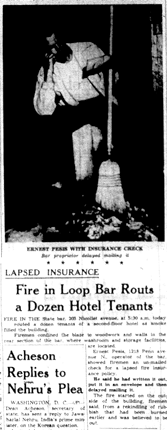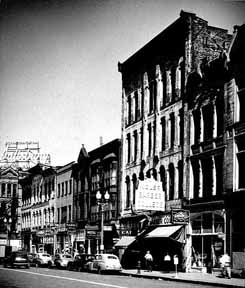Difference between revisions of "State Bar"
(table +table +table +table) |
|||
| Line 13: | Line 13: | ||
</div><div style="text-align: center;"> | </div><div style="text-align: center;"> | ||
<small>'''Pesis examines his unmailed insurance application in a fire-damaged State Bar, 1950. Courtesy of the Minneapolis Star (now Star-Tribune).'''</small> | <small>'''Pesis examines his unmailed insurance application in a fire-damaged State Bar, 1950. Courtesy of the Minneapolis Star (now Star-Tribune).'''</small> | ||
| − | | In some respects, the State Bar was the last of its kind. Shrouded in mystery and forgotten by most in Minneapolis, the establishment was a hole-in-the wall during the 1940s and 50s in the long-lost Gateway District. Other taverns, such as the Silver Dollar next door, gained substantial newspaper attention for serving alcohol to the “wrong” people.<small>(1)</small> Drunkards, prostitutes, and queer men were all part of this group, as were Native Americans; the Silver Dollar closed briefly in 1947 because it sold alcohol to Native people, which was illegal in Minnesota at the time.<small>(2)</small> | + | | In some respects, the State Bar was the last of its kind. Shrouded in mystery and forgotten by most in Minneapolis, the establishment was a hole-in-the wall during the 1940s and 50s in the long-lost [[Gateway District]]. Other taverns, such as the Silver Dollar next door, gained substantial newspaper attention for serving alcohol to the “wrong” people.<small>(1)</small> Drunkards, prostitutes, and queer men were all part of this group, as were Native Americans; the Silver Dollar closed briefly in 1947 because it sold alcohol to Native people, which was illegal in Minnesota at the time.<small>(2)</small> |
| Line 19: | Line 19: | ||
| − | This was especially the case at the State, owned by none other than Ernest Pesis—a nefarious character in the history of Minneapolis’ gay bars. Pesis and his brother Ron would later purchase Sutton’s Place from Elizabeth Sutton in 1966<small>(4)</small>—he turned the gay bar into a dingy disco purely for the profit.(5) Disrespectability marred the lucrative business of gay bars for all but the most uncaring; locally, this relegated queer bar ownership to the “Jewish Mafia.”<small>(6)</small> | + | This was especially the case at the State, owned by none other than Ernest Pesis—a nefarious character in the history of Minneapolis’ gay bars. Pesis and his brother Ron would later purchase [[Sutton’s Place]] from Elizabeth Sutton in 1966<small>(4)</small>—he turned the gay bar into a dingy disco purely for the profit.(5) Disrespectability marred the lucrative business of gay bars for all but the most uncaring; locally, this relegated queer bar ownership to the “Jewish Mafia.”<small>(6)</small> |
{| {{prettytable}} | {| {{prettytable}} | ||
! | ! | ||
Revision as of 18:53, 21 March 2010
Nicollet Avenue between First and Second Streets, Minneapolis, MN
Pesis examines his unmailed insurance application in a fire-damaged State Bar, 1950. Courtesy of the Minneapolis Star (now Star-Tribune). |
In some respects, the State Bar was the last of its kind. Shrouded in mystery and forgotten by most in Minneapolis, the establishment was a hole-in-the wall during the 1940s and 50s in the long-lost Gateway District. Other taverns, such as the Silver Dollar next door, gained substantial newspaper attention for serving alcohol to the “wrong” people.(1) Drunkards, prostitutes, and queer men were all part of this group, as were Native Americans; the Silver Dollar closed briefly in 1947 because it sold alcohol to Native people, which was illegal in Minnesota at the time.(2)
|
(1)Hart, Joseph and Hirschoff, Edwin C. Down & Out: The Death and Life of Minneapolis' Skid Row. Minneapolis: University of Minnesota Press, 2002.
(2)Roshiem, David L. The Other Minneapolis: The Rise and Fall of the Gateway, the Old Minneapolis Skid Row. Iowa: Andromeda Press, 1978. Page 164.
(3)Jacobs, Jane. The Death and Life of Great American Cities. New York: Vintage Books, 1961. Chapter 10: "The need for aged buildings." Pages 187-199.
(4)According to an inventory of Minneapolis City directories available on the 4th floor stacks of Hennepin County Central Library.
(5)Tretter, Jean-Nickolaus. Interview with the author and Jacob Gentz, 1/16/10
(6)Carlyle, Erin. "Rommal Bennett's Trial Revisits Spate of Gay Murders in the Twin Cities." City Pages, 4/7/2009. http://www.citypages.com/2009-04-08/news/rommal-bennett-s-trial-revisits-spate-of-gay-murders-in-the-twin-cities/
(7) "Fire in Loop Bar Routs a Dozen Tenants" The Minneapolis Star, 7/16/1950.
Part of Minneapolis/St. Paul, MN: 100 Queer Places in Minnesota History, (1860-1969), (1969-2010)

